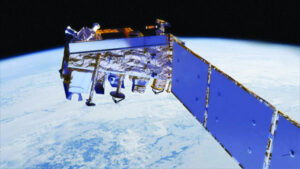U.S. Sen. Charles Schumer is warning that a lack of funding to the National Oceanic and Atmospheric Administration’s budget could lead to big problems with the nation’s weather satellites when the next big storm hits.
The New York Democrat said current congressional appropriation bills won’t provide enough funding for the agency, and he warned that storms like Hurricane Joaquin show the need to upgrade and maintain the nation’s fleet of satellites.
“It is just plain dumb to cut hundreds of millions from our weather satellite system just when catastrophic storms are getting more extreme and more frequent,” he said.
Schumer said underfunding in the bills will mean there will be only one polar-orbiting weather satellite scanning the Earth to help predict storms. Currently, two satellites continuously scan the planet, from north to south, providing data on atmospheric winds and moisture.
But the funding cut to NOAA’s budget will put one of the satellites out of commission, he said. It was not immediately clear when that would happen.
The federal government is expected to eventually have a replacement satellite operating, though there would be a gap of at least a year, beginning in 2016, before a new satellite could be launched, Schumer said.
He said federal officials have warned that the gap would likely impact their ability to predict major storms, like Joaquin and Superstorm Sandy.

“Though high above earth, they protect us on the ground,” Schumer said of the satellites. “Whether it is a big city, a small town or even a farm, accurate forecasts impact our lives, our economy and our futures. We must work to ensure these satellites are repaired and replaced on a regular basis.”
President Barack Obama has proposed $380 million for the new weather satellites. The Senate bill includes $135 million and the House version contains zero funding for the equipment.
The satellites mainly provide information to generate forecasts that predict weather and storms about seven days in advance.
(Associated Press writer David Klepper in Albany, N.Y., contributed to this report.)
Was this article valuable?
Here are more articles you may enjoy.

 Berkshire Utility Presses Wildfire Appeal With Billions at Stake
Berkshire Utility Presses Wildfire Appeal With Billions at Stake  Uber Jury Awards $8.5 Million Damages in Sexual Assault Case
Uber Jury Awards $8.5 Million Damages in Sexual Assault Case  Cape Cod Faces Highest Snow Risk as New Coastal Storm Forms
Cape Cod Faces Highest Snow Risk as New Coastal Storm Forms  Tesla Sued Over Crash That Trapped, Killed Massachusetts Driver
Tesla Sued Over Crash That Trapped, Killed Massachusetts Driver 